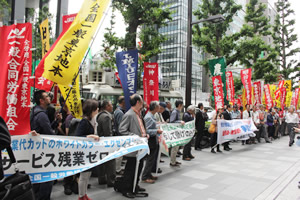Zenroren statement on the government plans for growth strategy approved by the cabinet
We oppose the governmentfs economic and fiscal policy that forces the working people to endure hardships
ODAGAWA Yoshikazu
Secretary General of the National Confederation of Trade Unions (Zenroren)
June 14, 2013
The government on June 14 approved the outline of its economic growth policy, announcing that the cabinet will take the initiative in implementing measures for ending deflation and revitalizing the economy.
The "outline" contains a number of numerical targets, including an average growth rate of three percent between FY 2013 and FY 2022 and a 1.5 million yen increase in nominal gross national income per capita over the 10 years.
The growth plans are: Participation in the Trans-Pacific Partnership (TPP) free trade talks, domestic market-opening to foreign multinational firms through easing labor law regulations and restrictions on investment speculations, and funding for accelerating infrastructure exports including nuclear power plants. In other words, these are intended to benefit large corporations. By contrast, the plans call for the workers and the public in general to pay more and to endure more hardships, ostensibly to rebuild the nation's finances through increasing the consumption tax and major cutbacks in social services. They are full of measures dedicated to prospering large corporations while destroying people's livelihoods. There is nothing we can expect from the Abe administration's call for ending deflation as the mainstay of its growth policy. Zenroren strongly protests the Abe Cabinet's approval of the outline of a growth policy and opposes its implementation.
The "outline" of the growth strategy says that the deflationary recession since the 1990s was caused by sluggish growth and gaps in interest rates between the yen and foreign currencies and that economic slowdown has discouraged corporations from making investment. But this explanation ignores the fact that wages have continued to decline only in Japan among the industrial economies and that large corporations have amassed huge amounts of internal reserves even in times of deflation. Without an accurate analysis of the present state of the nation's economy, no prescriptions for the economy are possible.
 New monetary easing and public investment constitute the first and the second of the three "arrows" of Abenomics. But these "arrows" are already losing steam, making it difficult to secure economic recovery by the end of FY 2013. Nevertheless, the "outline" underlines numerical targets without conceding the government's failure in economic policies. This is nothing but public relations with the upcoming House of Councilors election in mind. New monetary easing and public investment constitute the first and the second of the three "arrows" of Abenomics. But these "arrows" are already losing steam, making it difficult to secure economic recovery by the end of FY 2013. Nevertheless, the "outline" underlines numerical targets without conceding the government's failure in economic policies. This is nothing but public relations with the upcoming House of Councilors election in mind.
The main plans in the Abe administration's growth strategy include: Expansion of private sector investment; regulatory reforms giving corporate activities more freedoms; and the greater use of economic growth in the rest of the world, including Japanese companies' business abroad. These are measures that have been taken repeatedly since the mid 1990s. But, as a result, some of the major corporations grew into transnational corporations, creating a handful of wealthy people and driving the country into an economic bubble. This trend pushed down many workers' incomes, led to cutbacks in social services and forced people to pay more in taxes.
Without measures being taken to rebuild employment and people's living conditions that were destroyed by the "structural reform" policy, the government is trying to weaken worker protection, promote so-called labor mobility, and open the market to more private-sector services as well as goods. Acceleration of this process will inevitably widen income gaps and indefinitely increase the poverty rate.
The growth strategy plans say they will pursue economic reconstruction and fiscal reconstruction at the same time, with a further consumption tax increase being planned and by further cutting social security benefits. It also seeks to have pension payments pegged to macro-economic changes, threatening to cut social security benefits to elderly people. These cutbacks in social services are a violation of the constitutional right to live.
The growth plans that force economic policy mainly to benefit corporate activities on the workers and the general public will force the workers and the public in general to endure hardships and undermine people's living conditions. We will stop the growth plans. We reiterate our determination to help increase the campaign to say "No" to the government growth strategy in the upcoming House of Councilors election.

|

